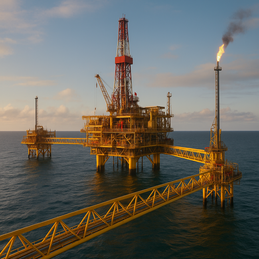The North Sea is no longer just a story of decline, it’s a landscape being reshaped by restructuring, taxation, and competing national…

The North Sea is no longer just a story of decline, it’s a landscape being reshaped by restructuring, taxation, and competing national strategies.
As the UK turns away from fossil fuels, major players are consolidating, while Norway continues to invest and extend the life of its fields. Together, these trends highlight how policy choices are shaping the basin’s future.
Restructuring and distress in the basin
Recent months have seen an increase in restructuring, consolidation, and insolvency risk across the UK North Sea and its wider oil and gas infrastructure.
Shell and Equinor have launched a joint venture called Adura, combining assets in response to tightening margins and growing regulatory pressure. This move reflects a wider trend among industry players to streamline operations and hedge against fiscal volatility.
Ithaca Energy has completed its combination with most of Eni UK’s upstream assets and acquired JAPEX UK in a deal worth approximately $193 million. These transactions significantly expand Ithaca’s footprint in the UK and position it as a leading mid-cap consolidator.
Smaller operators such as Serica and EnQuest are actively exploring mergers and acquisitions, repositioning themselves to survive in a high-cost, low-growth environment. For many, scale and access to capital are becoming essential for viability.
Petrofac remains under intense scrutiny. In July 2025, the UK Court of Appeal overturned the sanctioning of its twin restructuring plans, citing concerns around fairness and the allocation of value to “new money” investors. The company is now pursuing alternative restructuring routes while operating under an extended lock-up agreement with creditors.
Waldorf Production UK Plc, which has upstream exposure in the North Sea, has faced mounting financial stress. The Energy Profits Levy, combined with heavy debt burdens and reduced cash flow, has pushed the company to propose a restructuring plan. However, there has been resistance from creditors to its approval.
The collapse of the Prax Group and its Lindsey refinery adds another layer to the distress narrative. Although primarily a downstream operator with upstream interests, Prax’s insolvency, which was triggered by losses and complex debt structures, has put over 400 jobs at risk. Its parent company entered administration in June 2025.
The above is in addition to the failure of IOG Plc (dealt with by FRP Advisory), the business assets of which were successfully transferred to another operator in 2024.
This wave of restructuring and insolvency highlights that the stress extends across the value chain, affecting service providers, producers, and downstream asset owners. Many companies are navigating creditor litigation, appeals, and multiple restructuring strategies simultaneously.
Taken together, it appears that any business operating in the North Sea will depend on scale, a solid balance sheet and access to further capital.
Government policy
The UK Government has adopted a more restrictive stance on North Sea oil and gas development, confirming a ban on new exploration licences as part of its commitment to achieving net-zero emissions by 2050. The government is seeking to shift the basin’s focus toward offshore wind, carbon capture, and hydrogen, while maintaining oil and gas in the energy mix for the interim.
However, one source of the current issues is the UK’s current upstream marginal tax rate, which sits at 78% (30% Corporation Tax, 10% Supplementary charge and 38% Energy Profits Levy). In addition, the removal of the 29% Investment Allowance, offset only partly by a reduced Decarbonisation Allowance, has made more mature fields more problematic.
Industry body Offshore Energies UK estimates reforming the tax regime could unlock many billions of pounds of investment and support over 23,000 jobs.
Oil and gas projects require significant investment in upfront costs and many years to become cash generative. Without greater predictability and a clearer link between profitability and tax exposure, smaller operators may struggle to justify further UK investment.
Norway’s consistent approach
Norway provides a striking contrast. Interestingly, its petroleum tax rate is also 78 %, but as there has been little change in this for many years, the long-term stability and generous taxable deductions have fostered investor confidence.
Investment is expected to hit nearly US$30 billion in 2025, propelled by projects such as Johan Castberg and Balder X. Many Norwegian fields are now producing decades longer than first projected, thanks to the exploitation of smaller fields with existing infrastructure and technology upgrades.
As an example of Norway’s ongoing development and commitment to the North Sea, in 2024, 42 exploration wells were completed and 53 new production licences awarded.
Gas and energy security
Gas from the North Sea is increasingly viewed as a strategic asset. Norway now supplies around one-third of the EU’s gas, bolstering European energy security.
In contrast, the UK met only about one-third of its demand via domestic production last winter, relying heavily on imported gas via interconnectors and LNG. Projects like Shell’s Victory field (started in September 2025) illustrate the importance of maintaining domestic output, not just for supply balance but for resilience.
At a crossroads
Depending on methodology, the UK North Sea still holds significant reserves of oil and gas.
There remains significant opportunity in the North Sea — if the UK chooses to seize it. It could be a meaningful bridge in the energy transition project as well as a way to push down electricity prices and maintain the UK’s security. A more Norway-like approach to developing these reserves is possible, but only if the UK’s fiscal and licensing frameworks become more stable, predictable, and aligned with investment realities.
Looking ahead, the choices made now — by policymakers, investors, and operators — will determine whether the North Sea remains a declining legacy or evolves into a resilient, transitional energy hub.
If you’d like to discuss how these developments could affect your business or explore strategic opportunities in the basin, please get in touch.
…any business operating in the North Sea will be depending on scale, a solid balance-sheet and access to further capital.

/Passle/MediaLibrary/Images/2026-02-12-18-20-06-843-698e19d62b7f0a6b7cef4f39.png)
/Passle/611cdc8bfac91e0bc4343915/MediaLibrary/Images/2025-07-29-13-36-54-657-6888ce760035b54e65ddca5a.jpg)
/Passle/611cdc8bfac91e0bc4343915/MediaLibrary/Images/2026-02-09-14-47-07-971-6989f36b9d3b046f1fb1cc43.jpg)
/Passle/611cdc8bfac91e0bc4343915/MediaLibrary/Images/2026-02-05-11-01-36-114-69847890b45341fcafc483d0.jpg)